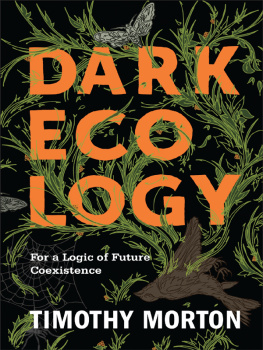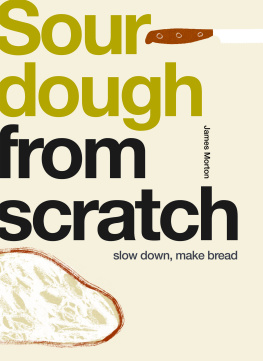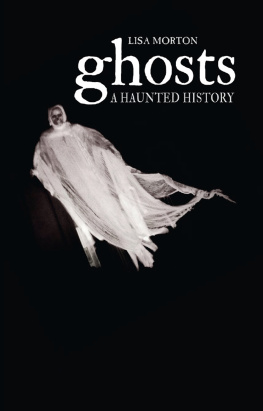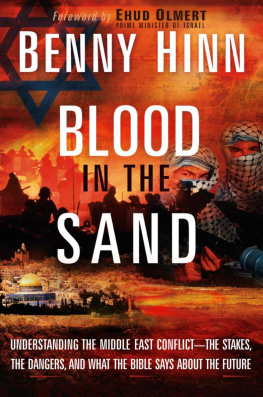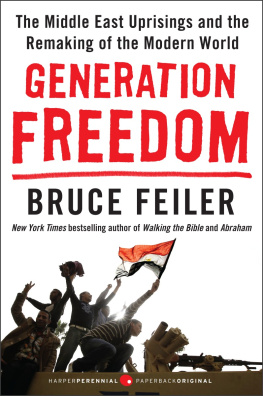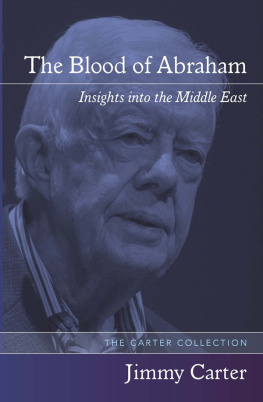Morton - The Field of Blood : the Battle for Aleppo and the Remaking of the Medieval Middle East.
Here you can read online Morton - The Field of Blood : the Battle for Aleppo and the Remaking of the Medieval Middle East. full text of the book (entire story) in english for free. Download pdf and epub, get meaning, cover and reviews about this ebook. City: New York, year: 2018, publisher: Basic Books, genre: History. Description of the work, (preface) as well as reviews are available. Best literature library LitArk.com created for fans of good reading and offers a wide selection of genres:
Romance novel
Science fiction
Adventure
Detective
Science
History
Home and family
Prose
Art
Politics
Computer
Non-fiction
Religion
Business
Children
Humor
Choose a favorite category and find really read worthwhile books. Enjoy immersion in the world of imagination, feel the emotions of the characters or learn something new for yourself, make an fascinating discovery.

The Field of Blood : the Battle for Aleppo and the Remaking of the Medieval Middle East.: summary, description and annotation
We offer to read an annotation, description, summary or preface (depends on what the author of the book "The Field of Blood : the Battle for Aleppo and the Remaking of the Medieval Middle East." wrote himself). If you haven't found the necessary information about the book — write in the comments, we will try to find it.
The Field of Blood : the Battle for Aleppo and the Remaking of the Medieval Middle East. — read online for free the complete book (whole text) full work
Below is the text of the book, divided by pages. System saving the place of the last page read, allows you to conveniently read the book "The Field of Blood : the Battle for Aleppo and the Remaking of the Medieval Middle East." online for free, without having to search again every time where you left off. Put a bookmark, and you can go to the page where you finished reading at any time.
Font size:
Interval:
Bookmark:
Copyright 2018 by Nicholas Morton
Hachette Book Group supports the right to free expression and the value of copyright. The purpose of copyright is to encourage writers and artists to produce the creative works that enrich our culture.
The scanning, uploading, and distribution of this book without permission is a theft of the authors intellectual property. If you would like permission to use material from the book (other than for review purposes), please contact permissions@hbgusa.com. Thank you for your support of the authors rights.
Basic Books
Hachette Book Group
1290 Avenue of the Americas, New York, NY 10104
www.basicbooks.com
First Edition: February 2018
Published by Basic Books, an imprint of Perseus Books, LLC, a subsidiary of Hachette Book Group, Inc. The Basic Books name and logo is a trademark of the Hachette Book Group.
The Hachette Speakers Bureau provides a wide range of authors for speaking events. To find out more, go to www.hachettespeakersbureau.com or call (866) 376-6591.
The publisher is not responsible for websites (or their content) that are not owned by the publisher.
Library of Congress Cataloging-in-Publication Data
Names: Morton, Nicholas.
Title: The field of blood : the battle for Aleppo and the remaking of the medieval Middle East / Nicholas Morton.
Description: New York, NY : Basic Books, 2018. | Includes bibliographical references and index.
Identifiers: LCCN 2017022600| ISBN 9780465096695 (hardback) | ISBN 9780465096701 (ebook)
Subjects: LCSH: Ager Sanguinis, Battle of, Syria, 1119. | Sarmada (Syria)History. | Artuqid dynasty, 10981408. | Crusades. | SyriaHistory7501260. | Islamic EmpireHistory7501258. | BISAC: HISTORY / Medieval. | HISTORY / Middle East / General.
Classification: LCC DS99.S26 M67 2018 | DDC 956/.014dc23
LC record available at https://lccn.loc.gov/2017022600
ISBNs: 978-0-465-09669-5 (hardcover), 978-0-465-09670-1 (ebook)
E3-20180122-JV-PC
For Maria and Lia
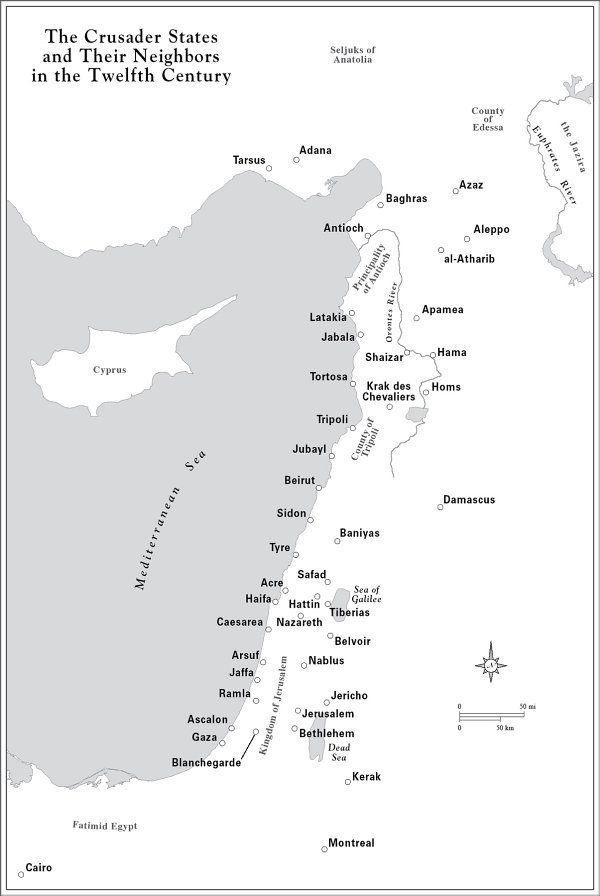
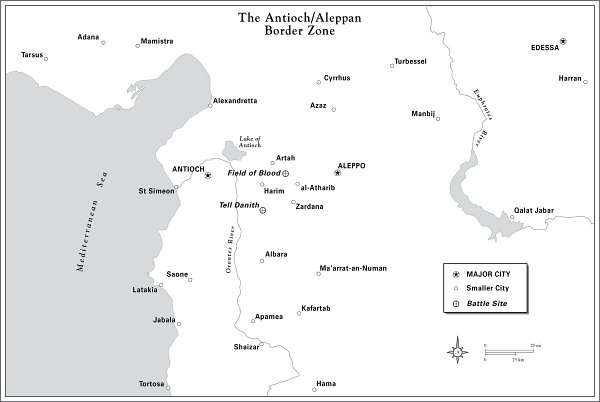
T HE SCREAM RANG out across the barren wilderness, the sound of a man in mortal agony. Corbaran, the Turkish ruler of Oliferne, sprang up at the sound, calling for his advisers and his crusader captives. He demanded that they listen in case the man should scream again. Corbaran did not know who had made such a cry, but the strangers evident distress filled him with pity. Then Baldwin of BeauvaisCorbarans prisonerspoke up. He had recognized the voice. It was his brother Ernoul. The brothers had been taken captive a long while before at the disastrous Battle of Civetot, during the First Crusade, but even their long separation could not make him mistake his own kin. The dying mans screams became more plaintive and more distant, as though he were being dragged away. Ernoul was calling on Saint Nicholas and the Virgin Mary before his words were suddenly cut short.
Even before they heard those distant cries, it had been a strange day. Corbarans Turkish army, along with its small band of captive crusaders, had not intended to be here. They had strayed into this stark land, which lay somewhere on the slopes of Mount Tigris, when the wind had flung a blizzard of dust into the air, disorienting them and causing them to mistake their road. It had been achingly hot, and they had made camp in a small orchard. Neither the Turks nor the Franks knew where they were, but they all feared that they knew what was causing the distant knight such distress. It was the great dragon Sathanas. They had tried to avoid its lair but had instead strayed directly into its hunting grounds.
Overcoming his terror, Baldwin demanded that his captor permit him to save his brother. Corbaran refused. He warned Baldwin that deep in the mountain was an ancient city that the dragon had ravaged long ago. Now it was deserted, save for the beast, and no man in his right mind would seek to enter those crags to confront him.
Still Baldwin would not be dissuaded, and Corbaran reluctantly yielded, granting his captive and friend the weapons he needed. The Turkish lord invited Baldwin to pick his own arms, and he selected a white chain-mail hauberk, a helmet, a shield, two swords with silver hilts, and a javelin. Then he confessed himself to his fellow captive, the bishop of Forez, who appealed to God that Baldwin might live to see Jerusalem. He set off on foot up the mountain, leaving both Turks and Franks grieving for him as though he were already dead.
Baldwin proceeded cautiously up the ruined road into the mountains. He climbed for many hours into the high places, feeling the weight of his weapons and sweating profusely. Nothing but toads, worms, and snakes lived in those desolate crags. By the time he reached the summit, he was reduced to crawling on his hands and knees. At the peak he commended himself to Christ in preparation for the coming battle and called out boldly to the dragon, challenging it to come out and fight. Then, rounding a boulder, he came upon the beast. It was asleep, having gorged itself on Ernouls corpse; only the poor knights decapitated head remained.
When Baldwin approached, Sathanas awoke and reared up, displaying the full length of its great scale-armored body. The spines on its torso bristled, and it raked its vicious talons against the rocks. Baldwin made the sign of the cross and, calling upon Christ and the saints, flung his javelin at the beast. It was a valiant throw, but it made no impression at all on the demon-possessed monster, and the shaft snapped. The dragon bellowed in rage. Far away Corbaran and the French knights heard the roar and, summoning their courage, determined to climb the mountain to aid Baldwin.
Baldwin and Sathanas flung themselves into combat, talon against sword, in a mortal struggle. Baldwin raised one of his swords, inlaid with a silver cross, but the beast seized it in its jaws and broke it in two, swallowing the fragments. But God caused the broken blade to grow in the dragons chest so that it nearly burst out, causing the beast to writhe in pain.
Baldwin thrust his second sword into the serpents mouth. Sathanas lurched, and the Devil flew out of the beast in the guise of a raven. Convulsed with agony, Sathanas battered at Baldwin, knocking his helmet from his head, leaving him bloodied. Baldwin then swung his blade down hard on the dragons head, but it simply rebounded

The great duel between Baldwin of Beauvais and the dragon Sathanas forms part of a dramatic tale known as the Chanson des Chtifs, which tells the story of a brave group of crusaders imprisoned during the First Crusade who had to fend for themselves in distant lands under their Turkish captors. The earliest version of the story was commissioned in the mid-twelfth century by Raymond, prince of the crusader Principality of Antioch (a large and well-fortified territory situated in the coastal region of northern Syria). The Chtifs is a work of fantasy, yet, like most fictional tales, it communicates a great deal about its intended audience.
This was the kind of story that would have been recited at feasts, when the guests had eaten their fill and were ready to set aside their cares to hear songs of war, heroic knights, mythical beasts, and beautiful maidens. Although the assembled dignitaries of the Antiochene court would undoubtedly have enjoyed the escapism of the dragon slayingpresumably shouting their approval and banging the table as Sathanass body crumpled to the groundthere was nonetheless a great deal in this tale that spoke profoundly of the realities of their own lives on the frontiers of the known world.
Font size:
Interval:
Bookmark:
Similar books «The Field of Blood : the Battle for Aleppo and the Remaking of the Medieval Middle East.»
Look at similar books to The Field of Blood : the Battle for Aleppo and the Remaking of the Medieval Middle East.. We have selected literature similar in name and meaning in the hope of providing readers with more options to find new, interesting, not yet read works.
Discussion, reviews of the book The Field of Blood : the Battle for Aleppo and the Remaking of the Medieval Middle East. and just readers' own opinions. Leave your comments, write what you think about the work, its meaning or the main characters. Specify what exactly you liked and what you didn't like, and why you think so.


